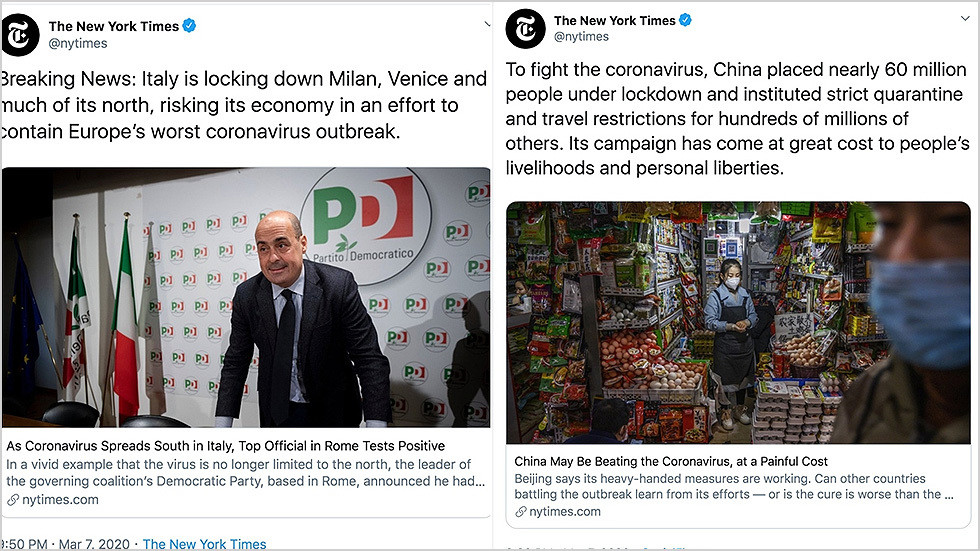National responses to tackling the coronavirus pandemic in China and Italy have given rise to jaw-dropping double standards at The New York Times.
For it seems that locking down around 60 million people in China is tantamount to a gross human rights violation, while doing the same to 60 million Italians is a bold step forward showing an enhanced sense of community that should be universally applauded.
The West = good. China = bad.
This rank hypocrisy, borne of a desperate liberal need to unnecessarily politicize everything, including the Covid-19 outbreak, has revealed an unflattering truth about ‘The Gray Lady,’ its sobriquet that once conveyed the impression the paper possessed of high virtue. No longer.
“China May Be Beating the Coronavirus But At a Painful Cost,” the NYT tweeted one day last week, flagging up its report that the Chinese lockdown and quarantine, which covered 60 million people, coincidentally the same as Italy’s entire population, “has come at great cost to people’s livelihoods and personal liberties.”
Then just 20 minutes later, up popped the same publication’s tweet on the European situation, announcing “Italy Locks Down Much of the Country’s North Over the Coronavirus.” So, did the Times condemn this as an attack on civil liberties by a nasty totalitarian regime?
Not quite. Because while at the time of the report, last Saturday, when only the north of Italy was affected (since expanded to include the entire country), there was a clear change of tone.
According to The Times: “By taking such tough measures, Italy, which is suffering the worst outbreak in Europe, sent a signal that restrictive clampdowns at odds with some of the core values of Western democracies may be necessary to contain and defeat the virus.”
So, lemme get this right. Restrictive clampdown in Italy? Necessary. Restrictive clampdown in China? A cure worse than the disease.
The Times had earlier, just 20 minutes earlier in fact, gone to some pains to list the key problems China had caused by the measures it chose to protect the spread of what was then just a good ol’ epidemic, rather than full-blown pandemic.
“The economy has ground to a near standstill, and many small businesses say they may soon run out of cash. Patients with critical illnesses are struggling to find timely care, and some have died,” the newspaper reported online.
But in Italy, it told readers in a new report three days days later, officials had, “pleaded for still stronger measures that would essentially shut down all commercial activity and public transportation in an effort to suffocate the contagion.” No mention of this being a bad thing.
So while the Italians shut up shop (literally), the anticipated effects were not unique to China and to suggest that economic woes and a public health crisis were somehow unusual given the circumstances is simply taking all the bad things that have happened and saying they’re all specifically Chinese problems caused by its handling of the virus outbreak.
Sorry, I don’t buy it.
And neither did The Times reader who commented: “Locking down Wuhan has saved millions of others within and outside of China, including my families who live only 50 miles from Wuhan. Stopping China's economy is for the sake of basic human right (sic), that is, to live and be healthy.”
Within the space of just 20 minutes, you suddenly got a crystal clear idea of the skewed worldview held by the liberal media in Manhattan that, thanks to an international reputation, it freely disseminates via online publication and social media.
It’s a shame that unless a plucky reader is lucky enough to have their remarks flagged up or approved by The Times’ comment editors, the newspaper’s biased reports and unbalanced views continue to go unchallenged.
You start to see why Donald Trump treats them with such contempt.
Source: Russia Today



























